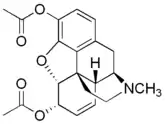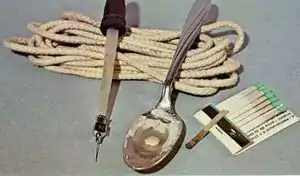Heroin
Heroin (diamorphine or technically, diacetylmorphine) is an alkaloid opiate created by acetylation of the two alcohol groups with acetic anhydride in the morphine compound in opium. It was originally invented at St Mary's Medical School in London in the late 19th century, and was subsequently resynthesised 23 years later by Bayer and marketed as a "non-addictive" substitute for morphine, which at the time was a popular recreational drug.[2]

| Our secret stash of Drugs |
| Highs and lows |
v - t - e |
“”Golden Brown, texture like sun Lays me down, with my mind she runs |
| —Golden Brown |
“”Now I'm surfin' on heroin. I'm so fucked up I can't remember my name. |
| —Forgotten Rebels, "Surfin' on Heroin"[1] |
Heroin is a long-lasting painkiller that will take away pain you never even knew you had. Heroin is notoriously addictive - almost as addictive as cigarettes! - and is known to create a high tolerance amongst regular users. Withdrawal from heroin is one of the worst withdrawal experiences, many times requiring intervention and counseling, though withdrawal is not physically dangerous as is the case with alcohol and benzodiazepines which can be fatal if not properly monitored. Collapsed veins and decreased liver function are other side effects of the drug due to frequent needle use and the drug's high potency, respectively. Due to the constipating effects of opiate drugs, you will also crap like a race horse on Ex-lax when it wears off.
In ascending order of potency, as the poppy is further refined it is turned into:
- Munchkin music
- Codeine
- Laudanum
- Opium
- Morphine
- Heroin
- Desomorphine
- Fentanyl
As these increase in the potency of both their painkilling effect and addictive qualities (with accompanying side-effects) a balance between is struck for medical use. Codeine is prescribed as a painkiller, while morphine is restricted for more serious cases and usually restricted to hospitals and paramedics. Heroin itself is used medicinally in the UK, for the same sorts of reasons as morphine, such as severe physical trauma, post-surgical pain, and chronic pain from terminal illnesses such as cancer. However in the USA, heroin is listed as a Schedule I drug, and despite its strong similarity to other legal opioid painkillers, it is not deemed to have any medical value.
Pharmacology
Diamorphine is a prodrug, having very little affinity for the μ-opioid receptor due to the 3-hydroxy group being acetylated, and is metabolised into morphine, 6-Monoacetylmorphine (6MAM), and 3-Monoacetylmorphine (3MAM), the most potent of which is 6MAM.[3] 6MAM is only produced as a metabolite from heroin and is therefore used as a specific test in human drug tests for heroin abuse, as other opiates such as codeine are partially metabolized into morphine.[4] Heroin is far more potent than morphine as the acetylation of the two alcohol groups makes it far easier for the molecule to cross the blood-brain barrier, where it is subsequently converted into the active metabolites.
6MAM and morphine act primarily on the μ-opioid receptor, which is a g-protein coupled receptor which in turn inhibits adenylyl cyclase, having the knock-on effect of reducing intracellular cyclic AMP (cAMP). With chronic exposure, the cell will respond by producing more adenylyl cyclase, creating a tolerance, and marked withdrawal symptoms on heroin cessation due to massively increased intracellular cAMP levels.[5]. One of the symptoms of opioid withdrawl is piloerection (goosebumps) leading to pimply-looking skin and is where the term "cold turkey" is derived from.
Antidotes
The specific antidote to opioid poisoning is naloxone, a short acting (10-20 mins) opioid receptor antagonist which binds with high affinity to the μ-opioid receptor but lacks any efficacy to cause the receptor to activate the g-protein. As it is so short-acting, multiple doses are required to avoid the patient slipping back into opioid coma.[6] It is not, as depicted in certain movies, effective to inject someone directly in the heart with adrenaline who has suffered an overdose, as the primary problem caused by heroin overdose is paralysis of the diaphragm, causing respiratory depression and subsequent suffocation.[7] A longer acting opioid antagonist, naltrexone, is used to help ex-addicts to quit by blocking the effects of any future opioid abuse. Another common cause of death in heroin users is choking on one's vomit, which is the unfortunate result of three effects of opioids: vomiting, narcosis, and antitussion (suppression of the cough reflex).
Methadone
Methadone, a synthetic opioid, is sometimes used in the treatment of heroin addiction. The thinking is that, since methadone operates on the same receptors as heroin, it curbs the craving for heroin without producing the same euphoric effect. Methadone also stays in the body for much longer than heroin - about 48 hours to heroin's 8. This makes tapering the dose downwards much more comfortable and manageable. The downside to this is that abruptly ceasing methadone use (going cold turkey) leads to terrible withdrawal symptoms which can last as long as several weeks.
Health effects
Pure heroin is not actually all that damaging to your health, apart from being horribly addictive. The main hazard of present-day street heroin is (a) impurities (i.e., most of it) (b) unpredictable purity (leading to accidental overdoses) (c) most methods of actually getting it into the blood stream (i.e. using even clean needles can still eventually result in a collapsed vein) (d) the criminal subculture surrounding it.[8] But rest assured, government policies on illegal drugs are firmly evidence-based and sensible.[citation NOT needed]
Since about 2015, an alarming amount of street heroin is adulterated with fentanyl, a potent opioid used in extremely dilute quantities for pain management in cancer patients. Fentanyl is 30 to 50 times more potent than pure heroin, and so toxic that first-responders to overdoses have themselves overdosed simply by touching the stuff or breathing near it. Fentanyl-laced heroin has been responsible for a growing number of deaths, and is a major part of the opioid crisis in North America.
Heroin chic

Heroin chic refers to a fashion trend that required being underweight, deathly pale, poorly groomed (i.e., messy hair), and wearing dark glasses to hide one's constricted pupils. It also led to movie actors needing to know how to convincingly "shoot up", much as actors in the forties had to know how to smoke cigarettes. Heroin chic was largely popularized in the 90s by movies such as Trainspotting and English model Kate Moss.
Street names
As with most drugs, heroin has plenty of slang terms that refer to it. Here are a few:
Heroin in popular culture and the arts
This list of miscellaneous information is endorsed by the RationalWiki Pub Quiz Team!
Music
John Lennon and Yoko Ono famously justified their heroin dependency by claiming "artistic privilege".
Numerous artists have sung the praises, or damnations, of heroin:[note 5][note 6]
- The Rolling Stones: just about every song on Sticky Fingers
- Red Hot Chili Peppers: "Under the Bridge", "Knock Me Down"
- Alice in Chains: "Junkhead", "God Smack", "Hate to Feel"
- Forgotten Rebels, "Surfin' on Heroin"[1]
- John Lennon: "Cold Turkey"
- Neil Young: "The Needle and the Damage Done"
- The Velvet Underground: "Heroin", "I'm Waiting For The Man", et cetera
- The Beatles: "Everybody's Got Something to Hide (Except for Me and My Monkey)", "Happiness is a Warm Gun" [note 7]
- William Burroughs: his life and works. Get it? Ha ha.
- Sid Vicious: well, he was a junkie, but it didn't make him an "artist"
- Pink Floyd: "Comfortably Numb"
- The Chameleons: "Mad Jack"
- The Heartbreakers: "Chinese Rocks" (written and later performed by Dee Dee Ramone, of The Ramones under the name "Chinese Rock")
- Anything involving Peter Doherty
- Ultravox!: "White China"
- Scorpions: "China White"
- Suede: "Herione"
- Neworder: "True Faith"
- The Stranglers: "Golden Brown"
- Elliot Smith: "A Fond Farewell", "King's Crossing"
- John Prine: "Sam Stone" (It's actually about morphine, but it's a great song either way)
- MGMT: "Time to Pretend"
- System of a Down: "She's like Heroin"
- The La's: "There She Goes"[9]
- Ministry: "Dark Side Of The Spoon"
- The Grateful Dead: "Victim or the Crime"
- Steely Dan: "Time Out of Mind"
- Guns N' Roses: "Mr Brownstone"
- Rammstein: "Adios"
- The Only Ones: "Another Girl, Another Planet"
- The Pogues: "Smell of Petroleum"
- Epica: "Chasing the Dragon"
- Depeche Mode: "Never Let Me Down Again"
- Ranking Roger: "One Minute Closer (To Death)"
- Theo Katzman: "Plain Jane Heroin"
Movies
- Trainspotting
- The Dog Soldiers
- MacArthur Park
- Basketball Diaries
- Panic in Needle Park
- Pulp Fiction
- American Gangster
- Drugstore Cowboy
- Gridlock'd
- Candy
- The Man With The Golden Arm
- Christiane F. – Wir Kinder vom Bahnhof Zoo
- Requiem For a Dream
- Gia
Shows
- The Wire
- Breaking Bad
- House M.D.
- The Sopranos
See also
- Afghanistan - World's largest producer of opium poppy.
Notes
- The name "Golden Brown" being a reference to the color of Afghan heroin, and the lyrical content being a reference to the sensation of "nodding" (the lengthy day-dream like trance that opiates induce, when the user's mind enters a euphoric space between waking thought and sleep).
- China white nowadays more often refers to a completely different and chemically unrelated opioid, alphamethylfentanyl (an analogue of fentanyl), and not to actual heroin (though it is sometimes referred to as "synthetic heroin"). Like fentanyl, it's nasty stuff, since it's so potent it's almost impossible to cut properly.
- "Black tar" specifically refers to low-grade Mexican heroin prepared with acetyl chloride or cut with burnt lactose. Ironically, it was considered responsible for dampening the impact of HIV infection in US West Coast junkies during the 80s and 90s because it has a nasty tendency to clog needles.
- Actually refers to Morphine Sulphate pills which are diluted down into a delicious liquid, perfect with a side of bacon or for when those unexpected guests drop by.
- This list is far too slanted toward Rolling Stones, John Lennon, Pink Floyd type music that nobody cares about anymore because classic rock radio has ruined them. Please help us out by adding some more obscure songs, but nothing so obscure as the Heartbreakers (even though "Chinese Rocks" has its own Wikipedia article) or the Mentors.
- Wikipedia (for now) has a whole subsection
File:Wikipedia's W.svg of apparent heroin references in music in its heroin article - However, the Beatles only ever admitted to one of their songs being about drugs at all, that being... "Day Tripper". (What, you thought it was going to be the one about that chick in the air with the shiny rocks?)
References
- Surfin' on Heroin by Forgotten Rebels, Lyrics.
- Heroin History (WP)
File:Wikipedia's W.svg - Relative cataleptic potency of narcotic analgesics
- Interpretation of the presence of 6-monoacetylmorphine in the absence of morphine-3-glucuronide in urine samples: evidence of heroin abuse
- Adenylyl Cyclase Superactivation
- Opiate Poisoning
- Pulp Fiction: Adrenalin shot straight to the heart
- http://flatearthnews.net/footnotes-book/page-28-heroin/whats-wrong-war-against-drugs
- http://www.ilxor.com/ILX/ThreadSelectedControllerServlet?boardid=41&threadid=47172